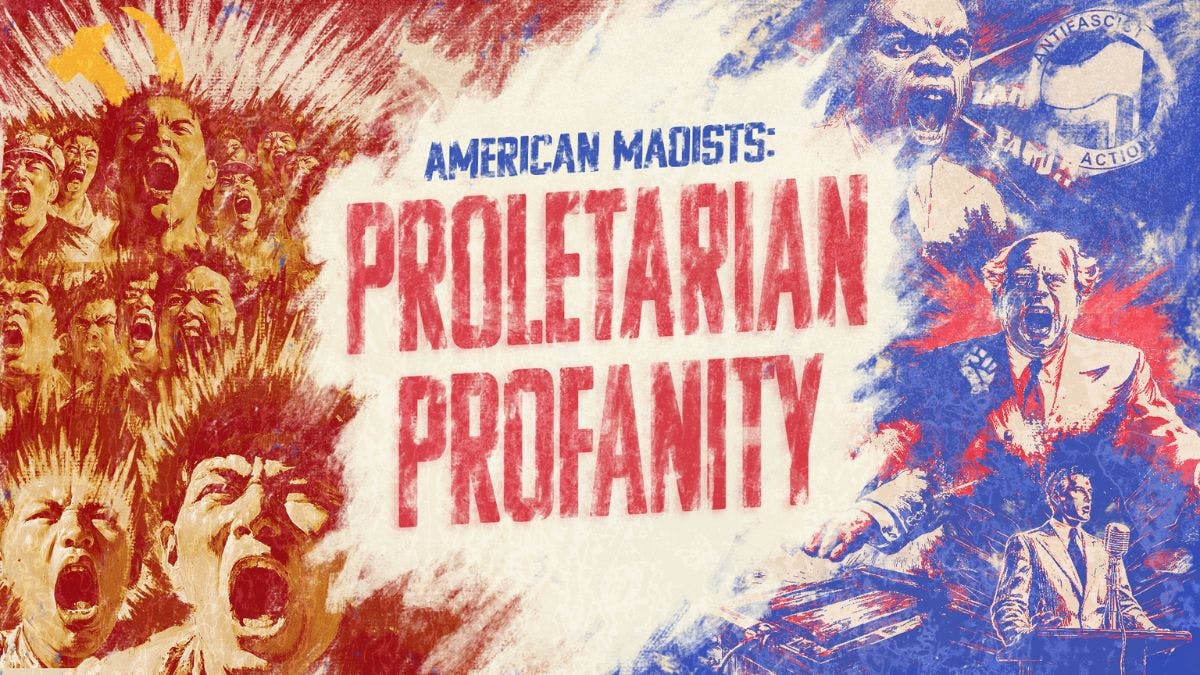Editor’s Note: This is the fourth installment in the five-part series “American Maoists: Warnings From The Cultural Revolution.”
In Part III, Xi Van Fleet and Sasha Gong — both activists, scholars, and survivors of Mao’s communist uprising — revealed why destroying womanhood is essential to the revolutionary project.
Today, the authors take up Democrats’ recent embrace of foul language. It turns out that what seems like a cringeworthy attempt to appear edgy and cool is actually a tried-and-true strategy of revolutionary movements — one that Maoists used to frightening effect.
***
After the 2024 election, Democrats convinced themselves that their problem was not their embrace of divisive radical ideology or failed policies, but poor communication with the people — particularly working-class voters.
Their conclusion was simple: Donald Trump had won over working-class and minority men through vulgarity. If Trump could toss out blunt, unpolished lines, then they believed they could surpass him — and regain an electoral edge — by lacing their speeches with profanity.
Their experiment over the past few months has been awkward at best. Many Democrats now spit out curse words with visible discomfort, as if swearing were a foreign tongue.
With the exception of lawmakers like Texas Congresswoman Jasmine Crockett — a lawyer who seamlessly flits between courtroom diction and a less polished vernacular — most Democrats can’t pull this off. Audiences have noticed the fakery and have been quick to mock the lawmakers and their newfound “edge.”
But something more sinister is afoot with Democrats’ sudden embrace of profanity.
In Mao’s China, where both of us grew up, the first casualty of the Cultural Revolution was not lives, but language. For millennia, Chinese tradition prized harmony, and criticism was expressed through subtlety, suggestion, and indirection.
Then, Mao launched the Cultural Revolution with a short essay in the People’s Daily in which he branded his opponents “poisonous.”
“They have puffed up the arrogance of the bourgeoisie and deflated the morale of the proletariat,” Mao wrote. “How poisonous!” He demanded their purge, hinting even at their physical destruction. Red Guards, intoxicated with revolutionary zeal, followed his lead. And to prove their proletarian authenticity, they laced every sentence with the Chinese equivalent of the F-word, reducing a once-elevated language to a blunt weapon of class struggle.
Crudeness soon became a prerequisite for joining the Red Guards, while proper speech was denounced as bourgeois and unworthy of the revolution. Almost overnight, vulgarity filled big-character posters, leaflets, even newspapers and magazines.
The belief was simple: the cruder the words, the closer one stood to the “chosen people” of the revolution — workers, peasants, and soldiers.
Obscenity fused seamlessly with violence. Students became mobs, hurling profanities as they smashed classrooms, beat teachers, and paraded “class enemies” through the streets. Language collapsed into humiliation, torture, and public killing. For 10 years, Mao’s China lived under obscenity and terror. A generation had its soul poisoned; a civilization’s fabric was shredded.
The revolutionary tradition carries on in China today. More than once, the current Communist Party Chairman Xi Jinping has warned that China’s enemies will be reduced to fen shen sui gu — literally, “a body ground into powder and bones smashed to pieces.” If you wonder why Xi speaks with such brutal bluntness and violent vocabulary, the roots lie with Mao.
The Chinese Communists believed that vulgar language could rally the masses into revolutionary action. In practice, it mobilized the worst elements of society. The tragedy was that it never reflected the authentic voice of the working class. Real working people in China, though they might not speak the “King’s Chinese,” cherished the hope that their children would. They understood that education and refinement elevate one’s status. Coarse language, by contrast, chained people to the bottom. As George Bernard Shaw showed in “Pygmalion” —later adapted into the hit musical “My Fair Lady” — speech is the passport to opportunity.
Like Mao, Democrats operate on the same false assumption about their base. Instead of lifting the working class, they trap voters in a linguistic and cultural ghetto, telling themselves that this is what the people want and deserve — all while pretending to champion them.
By forcing obscenities into their speeches, Democratic leaders sound neither authentic nor loyal. They sound desperate.
They have also badly misread Trump. Pseudo-intellectuals assumed the president’s appeal lay in coarseness. In reality, it lay in candor. Trump does not speak from consultant-written scripts. He speaks with raw, sometimes jarring honesty that working people recognize. He stands with the average Joe because, culturally, he is one of them — not by wealth or pedigree, but by instinct.
He talks about jobs, factories, borders, and national pride. He despises management jargon and academic euphemism. His voters love him not for his rough edges, but for his faithfulness to what they live and feel. Democrats may try to imitate populists, but until they truly understand them, they cannot be believed.
Language can heal, elevate, and liberate. Or it can poison, debase, and destroy. In their anti-Trump frenzy, Democrats have humiliated themselves, degraded voters, and poisoned the young. They must stop — or be stopped.
READ MORE:
American Maoists, Part I: License To Kill: What Turns Normal People To Political Violence?
American Maoists, Part II: The Wheel Of Misfortune: Victims, Victimhood, And Victimization
American Maoists, Part III: From Red Guard To Blue Hair: Why Leftists Destroy Womanhood
Xi Van Fleet is a survivor of Mao’s Cultural Revolution, an activist, and the author of “Mao’s America: A Survivor’s Warning.”
Sasha Gong is a writer, scholar, journalist, and filmmaker. A dissident in Mao’s China, she holds a PhD from Harvard University and was previously Director of the China Branch at Voice of America.
The views expressed in this piece are those of the author and do not necessarily represent those of The Daily Wire.

